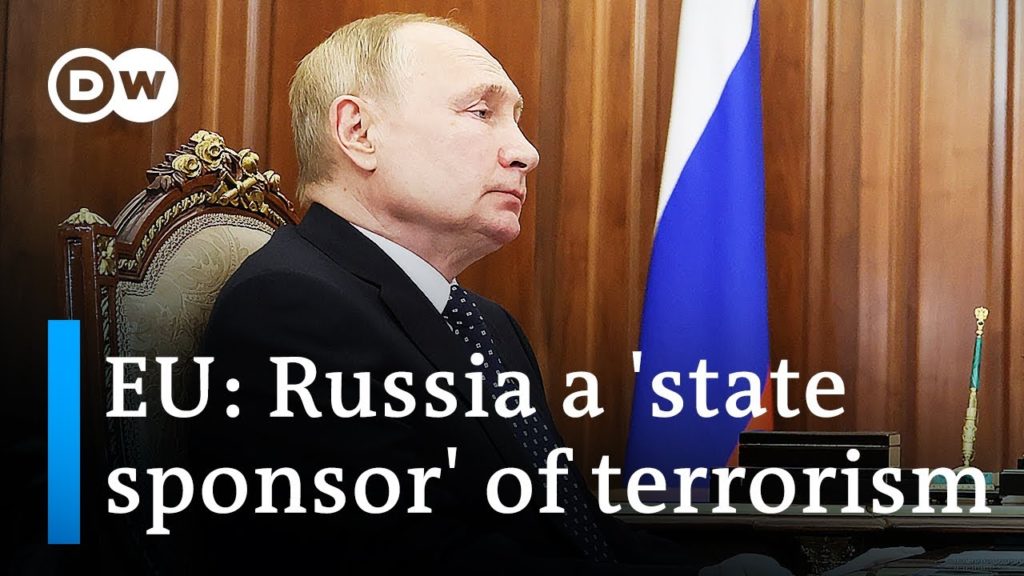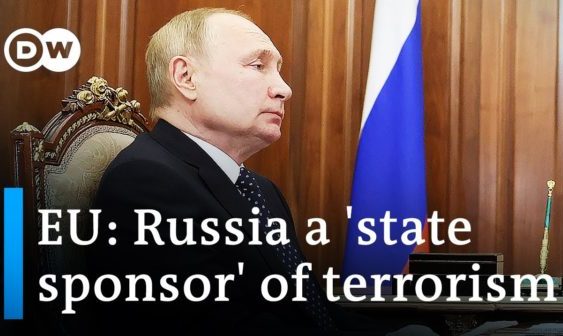
KYIV — The European Parliament on Wednesday adopted a resolution declaring Russia as a state sponsor of terrorism because of Moscow’s strikes on civilian targets, at the same time as Kyiv’s military administration reported three people were killed and half a dozen injured in a Russian missile strike on Ukraine’s capital.
“The deliberate attacks and atrocities committed by Russian forces and their proxies against civilians in Ukraine, the destruction of civilian infrastructure and other serious violations of international and humanitarian law amount to acts of terror and constitute war crimes,” the Parliament said.
The resolution was adopted with 494 votes in favor, 58 against and 44 abstentions.
The move is largely symbolic as the EU currently cannot officially designate states as sponsors of terrorism. Unlike the U.S., the bloc does not have a list of terrorist states and lacks a legal definition of the consequences of such a declaration.
The Parliament is therefore urging the EU and its member states to “put in place the proper legal framework and consider adding Russia to such a list.”
While some European states like Estonia, Latvia, Lithuania and Poland have already added Russia to their national list of terrorist states, the U.S. has held back from such a move.
The EU resolution, however, calls for further isolation of Russia internationally by stripping it of its membership in international organizations and bodies, reducing diplomatic ties with Russia to the absolute minimum and adopting a ninth sanctions package.
In Kyiv, the latest onslaught, which started at lunchtime, further degraded water and power supplies in a city that has already seen its energy capacity reduced by half since Russia on October 10 started launching large-scale missile and drone attacks zeroing in on the country’s power grid.
Some underground stations had to switch to generators and there were widespread outages in the city.
The strikes on Kyiv were part of a nationwide Russian attack with local administrations reporting blasts and explosions in Lviv, Ivano-Frankivsk, Vinnytsia and Zaporizhzhia. The head of Ukrainian railways, Alexander Kamyshin, tweeted: “My country is under heavy shelling,” adding that the strike was targeting energy, railway and civilian infrastructure. “Not yet, but we will #Keep Running. And yes, #OnSchedule, as usual. I promise,” he added.
In Kyiv, a residential building was hit, according to the city’s mayor Vitali Klitschko.
After welcoming the European Parliament vote, Ukrainian President Volodymyr Zelenskyy said in a statement that “the terrorist state continues to fight against civilians and civilian objects. As a result of a missile attack on the maternity ward of Vilnyansk hospital, an infant died and a woman was injured. There are probably still people under the rubble.”
Zelenskyy noted, too, that Russian missiles hit a high-rise building and another medical facility in Kupyansk, killing two people and injuring a third. “The enemy has once again decided to try to achieve with terror and murder what he wasn’t able to achieve for 9 months and won’t be able to achieve. Instead, he will only be held to account for all the evil he brought to our country.”
He added: “Russia must be isolated at all levels and held accountable in order to end its long-standing policy of terrorism in Ukraine and across the globe.”
Anton Gerashchenko, an adviser to Ukraine’s interior ministry, noted the European Parliament’s decision on Russia and tweeted“conformation received.”
He added: “Many Ukrainian regions are without electricity and water supply after Russian rocket strikes today. Rescue Services are doing all they can to restore supply, starting with critical infrastructure — hospitals, etc.”
Russian airstrikes on Ukraine’s critical infrastructure had always been launched on Mondays and Tuesdays — this is the first power-grid attack mounted on a Wednesday. Maybe because of that many of the city’s residents didn’t immediately head to shelters when the air-raid warnings sounded, suspecting it might be a false alarm, and the streets were still full of pedestrians heading to restaurants and cafes for lunch as the attack unfolded.
The underground stations started to fill as it became clear an air strike was really underway.
Two missiles hit an electrical transmission station in the Lviv region, said the head of the regional government, Maksym Kozytsky.
POLITICO


Leave a Reply
You must be logged in to post a comment.